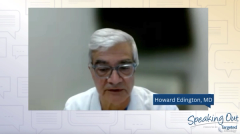
Engineering Oncolytic Viruses for Precision Cancer Treatment
Targeted Oncology spoke with Howard D. Edington, MD, about the advancements in engineering oncolytic viruses to be able to target specific cancers and various combination therapies with the novel treatment.
Episodes in this series

The potential of oncolytic viruses continues to be an ongoing topic of interest in the field of oncology. Researchers are continuing to evaluate this novel approach to cancer treatment within a number of trials as the field of oncolytic virus therapy is developing.
“There is a lot of work that is currently being done, including by my boss and the chairman of the [Allegheny Health Network] Cancer Institute, David L. Bartlett, MD, in terms of selecting other viruses that might be potential candidates for advancing the treatment options,” explained Howard D. Edington, MD, director of the Melanoma and Skin Cancer Center at Allegheny Health Network, in an interview with Targeted OncologyTM.
Research into oncolytic viruses is a promising avenue in the field of cancer therapy. By selectively targeting and destroying cancer cells while sparing healthy tissues, these viruses offer a novel approach to treatment.
While some viruses are less desirable, many can be engineered effectively based on their infectivity and their ability to carry engineered stretches of DNA or RNA.
Initial trials combining pembrolizumab (Keytruda) with oncolytic viruses did not yield expected results in terms of extending survival. However, Edington shared that there is optimism about the combination's ability to prime an immune response for future cellular therapies.
“In terms of necessarily prolonging life, the combination so far has not necessarily been proven useful. However, that does not mean that, to my mind, the oncolytic virus does not offer potential hope in the future, potentially for priming and immune response for later on cellular therapy.”
Despite recent negative trials, such as pembrolizumab with talimogene laherparepvec (T-VEC), an injectable modified oncolytic herpes virus for intratumoral injection approved by the FDA on October 27, 2015, which did not extend disease-free survival rates among those given the combination, there is still potential for these combinations to make tumors operable, thus offering hope for improved outcomes in the future.





















